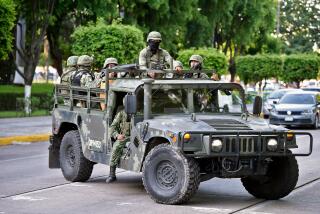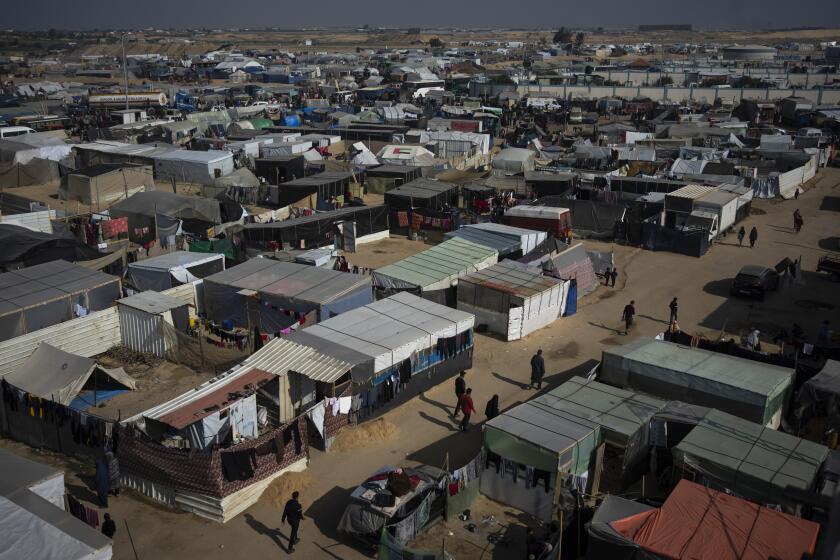Russians Feud, Imperil Planned Economic Union
Bitter feuding within the Russian Federation leadership burst into the open Wednesday with the resignation of the federation’s economy minister and ecology minister in the face of strong opposition to Russian membership in the new “economic community” binding together the remnants of the Soviet Union.
The two ministers, who support the economic union, quit after the acting prime minister, Oleg I. Lobov, rebuked them during a debate in the legislature for endangering Russian interests in negotiations to establish a common market among the former Soviet republics.
The angry confrontation not only left Russian Federation President Boris N. Yeltsin’s government in disarray but also put into serious doubt the proposed economic union, which is intended to halt the collapse of the Soviet economy and become the basis for reconstituting the country politically.
Fundamental questions are at issue: the role of Russia, the largest of the Soviet republics, in a new political and economic union and the character of that new state and its central government.
“In our opinion, the signing of the treaty as it has been formulated will inevitably lead to violation of the political and economic sovereignty of Russia,” Lobov told the Russian Supreme Soviet, the federation’s legislature.
“The way we see it, an attempt is again being made to revive, despite the denials of the authors, the predominant central authority over members of the (proposed economic) community.”
Lobov declared that the Russian Federation will not sign the treaty as it is now drafted, although a number of other republics have done so and Russia joined them last week in giving it preliminary approval. The treaty was expected to have been signed by at least eight and perhaps even 12 republics by mid-October.
Yevgeny F. Saburov, the Russian economy minister and a deputy prime minister, said he had initialed the economic union treaty with Yeltsin’s agreement and argued that there was no alternative if the country hoped to halt its economic disintegration. The ecology minister who quit, Igor Gavrilov, is another deputy prime minister.
Yeltsin, due back today from a two-week vacation on the Black Sea, did not comment on these resignations as his government appeared to be falling apart and reversing itself on a basic political as well as economic question.
Soviet President Mikhail S. Gorbachev, meanwhile, put forward a revised draft of a union treaty that would lay the political and constitutional basis for what he calls a “Union of Free Sovereign Republics.”
Rewriting the draft of a treaty that was to have been signed in August, Gorbachev reduced the central government to a minimum of functions, allowing it to do only what the republics agreed to in a series of separate treaties, according to a copy of the proposal obtained by the independent news agency Interfax.
The central budget would similarly be financed by agreed contributions from the member republics, not by federal taxes. The national armed forces could be used within the country only to cope with natural disasters, but a special militia would be formed to maintain peace among the republics and respond to inter-ethnic unrest.
Gorbachev’s new proposal may be taken up when he convenes on Friday the State Council, the country’s highest executive body, to discuss the deepening crisis.
Through the rancorous debate Wednesday in the Russian legislature, speaker after speaker denounced the proposed economic treaty as forcing Russia, by far the richest of the Soviet republics, to finance 80% of the costs of the proposed economic community but with no greater voice than the smallest or poorest member.
Vice President Alexander V. Rutskoi attacked the draft treaty as “a graphic example of banditry.” A political agreement must be reached among the republics before any economic treaty is signed, he said.
Under Yeltsin, Russia increasingly sees itself as the “successor”-- politically, economically and militarily--to the Soviet Union, and it is demanding that the other republics accept its dominance as a condition for future cooperation.
Saburov, quitting the key post of economics minister, angrily criticized his colleagues in the Yeltsin Cabinet and denounced “the inability of the Russian government in its present form to stabilize the economy and ensure the transition toward a market economy.”
Gavrilov charged that the infighting in the Russian government is damaging efforts to establish a democratic political system and a free-market economy.
From his beachfront vacation home, Yeltsin declared Wednesday that the transitional committee overseeing management of the Soviet economy was unconstitutional, according to Russian Television.
In a letter responding to Silayev’s resignation, Yeltsin questioned what little remains of the central government structure in the Soviet Union--although he had agreed on the committee’s formation with Gorbachev and had nominated Silayev as chairman.
The disarray is already paralyzing policy-making at most levels of government, according to many Soviet commentators, and the country’s political and economic transformation is all but halted.
Grigory A. Yavlinsky, vice chairman of the economic management committee and the principal architect of the proposed economic union, warned the Russian legislature that the Soviet economy is now shrinking at an annual rate of 17.5% and that the disintegration is accelerating.
“The level of 20% means complete paralysis, and this is something quite dramatic, something none of us has any idea of,” Yavlinsky said. “This stage may be reached next spring if nothing is done and the treaty is not signed.”
Viktor K. Grebenshikov, a reporter in The Times’ Moscow bureau, contributed to this story.
More to Read
Sign up for Essential California
The most important California stories and recommendations in your inbox every morning.
You may occasionally receive promotional content from the Los Angeles Times.






